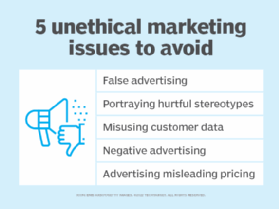
Getty Images/iStockphoto
5 ethical issues in marketing to avoid
Marketing is about attracting customers and making sales. However, there are some unethical advertising and promotion tactics that may cause people to mistrust your brand.
Customers want to do business with companies that are honest, responsible, transparent and sustainable -- both socially and environmentally.
Because of this, ethical issues in marketing have taken center stage. For example, the Balenciaga scandal made headlines in November 2022 as many said it exploited children and caused a social uproar. Today, consumers want ethical marketing that shows businesses are socially responsible and promote that in their marketing materials.
Ethical concerns and standards are part of a company's social responsibility, highlighted in a company's environmental, social and governance plan. Seventy-three percent of U.S. customers want to do business with ethical companies that support social justice, according to a report from Forrester.
Here are some marketing issues to avoid, helping you gain trust and a relationship with potential and current customers.
1. False advertising
False advertising happens when a company overstates or embellishes the benefits of its products and services. Overpromising can be harmful to gaining customers' trust.
Knowing your target audience helps narrow your message. Your products and services are a solution to someone's problem. If you market to the masses instead of targeting your message, you can create false promises.
Your product must match your message. Don't make any claims even if you think customers will understand it's a joke. False advertising can lead to negative brand perceptions if customers feel deceived or disappointed.
One example of false advertising is when 5-hour Energy alleged its energy drink was more effective than coffee and recommended by doctors. The company paid $4.3 million in penalties and fines.

2. Portraying hurtful stereotypes
When creating a message, consider if you are targeting a specific market or a stereotype. Examples of stereotypes include gender roles, race and age. Market research can help remove bias and assumptions and give specific demographics for a target market.
Avoid all campaigns that cross the line of target market demographics. The target market should be backed by research and not stereotypes. Market research challenges stereotypical judgments by talking to customers and studying the competition to speak appropriately to customers.
Using gender, race and age are sensitive topics, and without the right research, customers may call you out and let you know.
Learn about some common types of bias that can taint customer data analysis.
3. Misusing customer data
You might not even know that you are misusing your customer data. Third-party vendors may also be using this data without your knowledge, but customers will fault your business whether you are aware of the issue or not.
Make sure the data you collect is safe from third parties. You may want to consult with a privacy expert to ensure your customer data is safe and not sold to other parties without your knowledge.
Customer privacy is a big concern as people are skeptical of how companies use their personal information and track their behavior. However, companies use this information to understand their target market and help produce the products they want.
Transparency in marketing is critical to avoid crossing the privacy line. Most customers know that companies get information from them, but companies need to share what information they collect and how.
Make sure you have your privacy policy visible on your website, such as in the footer. Some companies also include messaging about cookies and how they are used. Others add pop-ups where visitors consent to using cookies before browsing.
TikTok has made the news with its data practices as it acknowledged that non-U.S. employees had access to U.S. users' data. States have started banning government employees from using TikTok to share information for this reason.
4. Negative advertising
Competition is a part of business, but you should never advertise the negatives of other companies to try to win their business. This type of negative advertising -- or smear tactic -- can be unethical.
Discrediting a competitor to gain new customers may do the opposite. Customers may lose respect for your company. You could also face a legal fallout with the other company if you name its brand in these advertisements.
Be sure to have clear standards for your promotions, and stick to highlighting your product or service benefits.
5. Advertising misleading pricing
There are some marketing issues involving price hikes and predatory promotions. When businesses artificially inflate prices either during a high-demand time or sales promotion, this is known as price hiking.
Predatory promotion is the practice of promoting extremely low prices to attract customers, stealing them away from competition. These advertised prices are typically so low that the competition can't beat the price, so customers leave for a better deal. After the customer signs on, the business returns to its normal pricing.
This bait-and-switch technique sometimes goes even further by advertising a lower price to get a customer's attention. The company then says the advertised products are unavailable and push the customer to more expensive choices.
Pricing is an important part of marketing, and being transparent about costs helps build trust with customers. Share your fixed prices, and show how your prices align with your products and services.
Differentiating your brand with ethical marketing
Highlight your values with transparency. Be truthful in your advertising, and don't mislead your customers.
The following are some ways to highlight your business ethically:
- Advertise business impact. Talk about your fair business practices. Explain any steps your business takes to limit environmental impact, but be careful not to overpromise -- a practice known as greenwashing. Give customers a look inside your production process, whether it's just showing your office or a manufacturing plant.
- Be responsible on social media. Discuss social and ethical issues responsibly. Let customers know where you stand and that you are an ethical brand without being too poignant to turn customers away. Customers appreciate that you are a socially responsible company.
- Engage in charitable giving programs. Several ethical companies -- such as Ben & Jerry's, Toms and Bombas -- want to give back to their community and social causes. Examples of these programs include collecting goods for local charities, donating one product for every product sold or matching monetary donations to charities.
The main part of ethical marketing is to tell the whole truth and never embellish it in any of your campaigns.
Learn more about using social media to boost your business.







